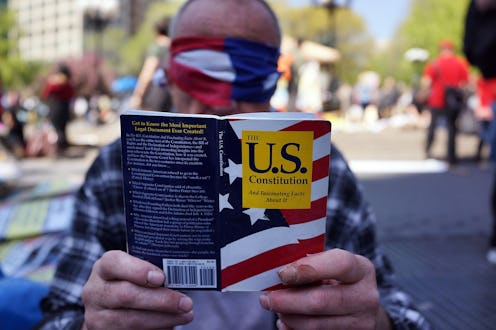News
U.S. May Day Rallies Merge With Baltimore Protests
This year’s International Workers' Day merged the labor rights movement with calls for racial equality, as thousands across the United States set off on May Day marches protesting police tactics and low wages Friday. May Day — a campaign for workers’ justice that has been held for 124 years — is a national holiday in many countries, although not in the U.S. But the small matter of work didn’t stop crowds from attending rallies across the country, where chants of “no justice no peace” met with calls for a $15 minimum wage. The uneasy climate in the wake of Baltimore’s heated clashes rendered the mostly peaceful protests somewhat tense, with demonstrations in several cities boiling over into unruly behaviour Friday night.
May Day's history begins May 1, 1886, when workers in Chicago walked out of their jobs en masse to pressure their bosses for an eight-hour workday. The isolated strike and its aftermath (a lethal anarchist bomb attack on a labor rally) blossomed into an international workers’ movement. But in the U.S., where the day was purposefully cast as radical, left wing agitation, according to The International Business Times, May Day marches only occasionally gain any real traction. Previously, the catalyst has been immigration reform. This year, with all eyes on Baltimore and the death in police custody of Freddie Gray, the sentiment spurring the rallies was “black lives matter.”
While marchers in Turkey were repelled by water cannon and feminists went topless in France, the U.S. May Day rallies were a fairly standard affair — although the protestors’ by now familiar chants against police killings were joined by a host of other issues. In demonstrations across downtown Manhattan, The Guardian reports that protestors chanted “disarm the NYPD,” but also added further demands: an increase in the minimum wage to $15, limits on carbon emissions, bolsters to migrant workers’ rights, and a crack-down on tax cuts favoring the richest Americans.
A participant, Sabaah Jordan, told The Guardian that the anger at the recent spate of lethal interactions between unarmed black men and the police was connected to the ongoing struggle for labor rights. “Black people are workers too,” she said:
and the racism and injustice that we see in the police we have to deal with in the workplace too… When we say ‘black lives matter’, we’re really addressing justice, not just with police. Racial exploitation is a critical issue, and confronting it is really creating a society for everyone. ‘Black lives matter’ is a sweeping statement.
As the crowd passed through downtown Manhattan, artists and activists occupied New York’s Guggenheim museum for a May Day action. The museum was effectively shut down as activist group Gulf Ultra Luxury Faction (G.U.L.F.) and their supporters demonstrated for better working conditions for construction workers currently building the planned Guggenheim Abu Dhabi. “It's an opportunity to highlight migrant labor issues, and it's a symbolic day of labor struggle,” Noah Fischer, of G.U.L.F. and Occupy Museums, told Gothamist. “We're bringing it home to the museum, because they're a player in the picture.”
Meanwhile, across the country in L.A., protestors turned out in force to advocate in favor of immigrants’ rights and against police brutality. The Guardian reports that two separate marches, the Full Rights March and the International Workers’ March, operated within police cordons across tracts of the city. Jorge-Mario Cabrera, a spokesman for the Coalition for Humane Immigrant Rights of Los Angeles, told the publication that the struggle for immigrants’ rights and the struggle against racial profiling and detrimental police tactics were interconnected. “We’ve been engaging with local groups to really look at what are some of the commonalities of the two struggles,” he said. “Immigrant community folks are detained and beat up too; mass incarceration isn’t anything new to both of our communities.”
In the Bay Area, attention turned to the affluent Silicone Valley community. Demonstrators attempted to “block the tech commute” by amassing at commuter hotspots for Google, Apple and Facebook employees. A notice for this ultimately ineffective protest was, somewhat ironically, posted to Facebook. Its rationale read:
The rich have begun colonizing North Oakland, West Oakland, and Downtown… [with] their tech buses, their pricey cafes, and their luxury apartments. Let them know that they are not welcome, that their high-priced world is not welcome, and their terrible world of surveillance and alienation must end.
Hundreds marched, too, in Philadelphia, Boston, Chicago and Detroit. There was some unrest towards the end of Friday’s diverse demonstrations, with reports of aggression towards police. The Sacramento Bee reports that protests in Portland, Oregon, contained isolated pockets of violence, after a splinter group broke off late Friday evening and began throwing objects at police officers. Similar skirmishes reportedly broke out in Seattle, where police said protestors threw wrenches and rocks at uniformed officers.
But many demonstrations across the city, including a Black Lives Matter rally and an immigrant rights march, remained peaceful. “We're all here for one reason and that's to unify the people,” protestor Jessica Ramirez told USA Today.
Images: Getty Images (4)
